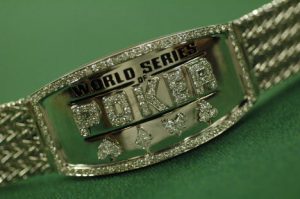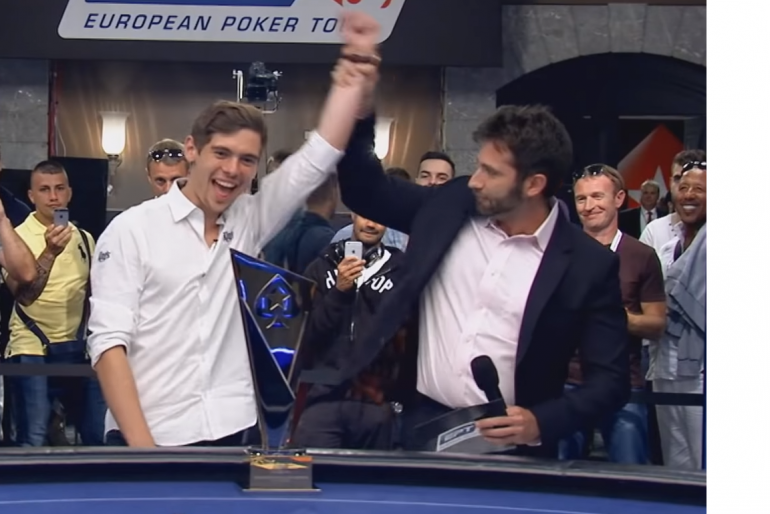The year 2016 was the most fruitful in Fedor Holz’s career, fully justifying his nickname — the CrownUpGuy. By then, he had already gained a reputation of a player who was capable of winning practically anything, whether it was an online or live tournament. And by July 2016, there seemed to be only one thing missing – the World Series of Poker bracelet. And he won it gaining $111,111 High Roller for One Drop in Las Vegas. His official final table result was $4,981,775.
This outstanding cash win was, of course, remarkable. But it was surely not only the money at stake. Arguably, the World Series of Poker bracelet mattered even more! Let’s find out why.
Table of Contents
Why the WSOP Bracelet?

Why the WSOP Bracelet?
The world-famous WSOP is a set of high stakes poker tournaments held annually in Las Vegas. It is considered by many to be the most prestigious series of poker events. The bracelet is the award given to the winner of every game. As of 2017, there have been as many as 74 winners. The bracelet in poker is regarded by many as an equivalent to the Davis Cup in tennis or the Stanley Cup in hockey – the highest-ranked trophy in this particular kind of sport.
And it became obvious Fedor Holz was going to compete for the bracelet at the 2016 WSOP, many months before the tournament took place. This was a fairly obvious inference, given his incredible poker performances at many live events and online tournaments prior to Vegas. So, one day, to become a real A-lister and a genuine poker star of the first magnitude, he was supposed to come to the U.S.A. and win something substantial in Vegas. Something like a bracelet. And funnily enough, this is exactly what he did!
A Long Way to Go? Then Walk Fast
What made his Dallas triumph possible? Surely it must have been his previous wins. In 2012, CrownUpGuy won his first live poker prize. It was a great result for a young 19-year-old novice – €15,320, after finishing second at the €500 No-Limit Hold’em GPT II Deepstack Series Main Event; this was a live tournament held in King’s Casino in Rozvadov, Czech Republic. The latter is well known as a first-class international poker venue in Europe where players from Germany and Central Europe love to play poker games.
Before that, at the age of 18, he was playing online quite a lot. He was winning several hundred € per month, improving rapidly and going for higher and higher stakes. He won his first tournament in 2013 – this was the $500 + 50 No Limit Hold’em event, Bounty Lebanese Poker Tour, for $4,695. So by this point, he was already touring all around the world, playing poker. In 2013, he successfully performed in High Roller 8 Handed ESPT Valencia (coming in 2d, for $8,877); Turbo EPT Monte Carlo (coming in 2d, for $45,894); and Lucky Number 7 High-roller event, Caribbean Poker Tour (coming in 2d again, for $35,000).
This was, of course, an obvious attempt to get as much live exposure as possible. Or rather, a unique Fedor Holz strategy that, as it turns out, worked like a charm! He also kept on playing online, winning more and more; like the $1.3 million he got from winning the World online Poker Championship in 2014.
But poker WSOP events were still his primary objective. In 2015, he tried to achieve this goal, but he finished only 25th in the World Series of Poker Main Event. He still won a decent sum of $262,574; but this was still a bit too far from the top!
In January 2016, Fedor won the Triton Super High Roller for $3,463,500; as well as $3,500,000 in the Super High Roller Bowl later that year. This, as we can see, was part of his success story in 2016, and a great prelude to the bracelet he finally won. Nobody could have told him that the bracelet was a pure coincidence or pure luck or whatever – there is actually no way to take this achievement away from him because the path he took to the bracelet is probably no less important than the bracelet itself!
Quitting after just Having Reached the Top
It might seem that Fedor Holz wanted the bracelet purely so he could “rightfully quit” poker. Only two days after winning the bracelet, Fedor Holz said: “I am not going to continue as a professional player.” Two years have already passed since then. And yet, he keeps on playing anyway, albeit not on the same ongoing basis as before; he has now won more than $6 million per year. But his gaming model has changed profoundly – for, as he is concentrating on high-roller series only, he sets aside plenty of time for other things. Chief among these is developing his business.
“If I don’t progress I just don’t feel happy,” said Holz once. Maybe he simply feels that he has reached his peak as a poker player. Or, maybe he feels that any further progress in his poker career is hard to achieve. Maybe so; but for his numerous fans around the world, such further progress in poker does seem very hard to imagine.
Fedor Holz Games: A Singular Phenomenon or a Systematic Trend?
The results of Fedor Holz are outstanding. But are they connected to his individual brilliance only, or is there any wider or deeper trend behind? Is there any fundamental shift in the world of poker, of which Fedor’s performance might be only a sign or part? Any kind of shift or metamorphosis, whose outcomes we are going to see pretty soon? These questions are quite natural; as the greatest performers in any sports always have links to, represent, or maybe even generate a profound change in the game they play. One thing is certain — the incredible results definitely stem from Holz’s poker strategy.
Some might consider Fedor and his outstanding performance in live tournaments a part of the “German phenomenon” in poker. German players have proven to be very strong in the past decade. “Ze Germans,” as they are sometimes called with a certain customary respect, are indeed motivated to study poker profoundly and systematically, investing a lot of time and effort into the theory of the game. New players from this country usually have a solid understanding of game theory, as well as demonstrating a solid background in the toughest games online, which also helps them a lot. They know that preparation is the key to success – and we know that Fedor’s preparations have included a lot of different training, and not only in poker.
Four of the top ten biggest money earners in poker in 2018 were from Germany. But there was only one in 2018. Guess who it was? That’s right — it was Fedor! And as long as Fedor Holz remains one of the best players in the game, he is sure to outperform everyone else.





